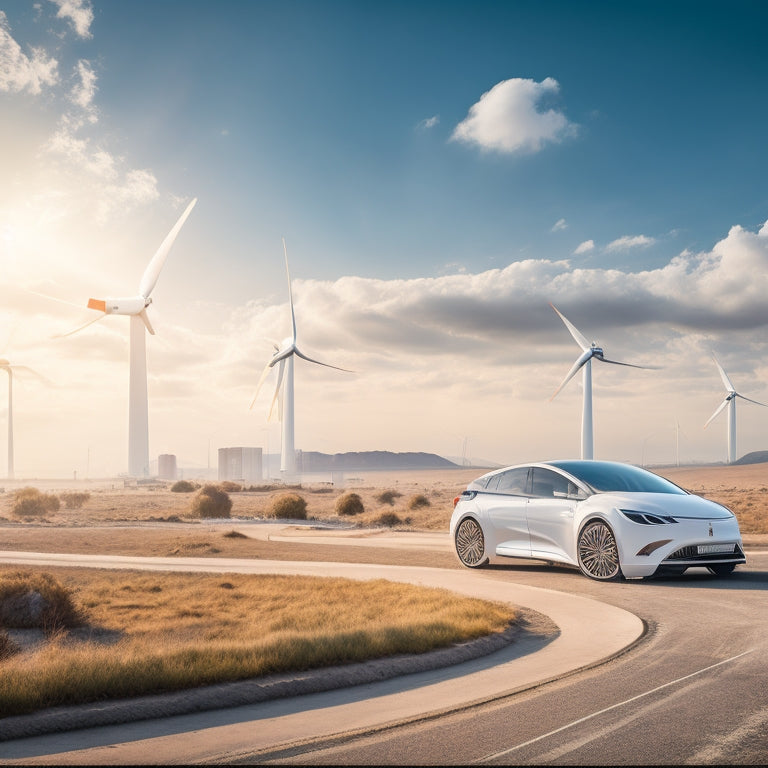
Charging Ahead: Renewable Energy for EVs
Share
As you charge ahead with renewable energy for your electric vehicle, you're likely considering solar power to alleviate range anxiety. You're not alone - large-scale solar farms are being integrated into EV charging infrastructure to minimize carbon footprint. Commercial solar panels are becoming the go-to solution for businesses, reducing energy costs by up to 50%. But that's just the beginning - innovative EV charging stations and the emergence of electric highways are set to revolutionize sustainable transportation. As you explore the future of EV fueling, you'll discover how harnessing solar power can extend your driving range and give you greater control over your energy needs.
Key Takeaways
• Solar power integration in EV charging infrastructure minimizes carbon footprint and enables sustainable energy for electric vehicles.
• Large-scale solar farms and energy storage systems ensure a reliable and efficient supply of clean energy for EVs.
• Harnessing solar power for EVs reduces dependence on non-renewable energy sources, leading to a cleaner environment and energy independence.
• Expansion of charging infrastructure in urban hubs and along highways alleviates range anxiety and increases confidence in EV adoption.
• Advanced renewable energy systems and smart grid management optimize the charging experience, making EVs a viable and sustainable transportation option.
Harnessing Solar Power for EVs
As you consider the possibilities of renewable energy for EVs, you'll find that harnessing solar power is a highly promising solution, with photovoltaic (PV) systems already being integrated into EV charging infrastructure.
By leveraging large-scale Solar Farms, you can tap into a clean and abundant energy source, reducing your reliance on fossil fuels. To optimize energy distribution, Energy Storage systems can be implemented to stabilize the grid and guarantee a consistent power supply.
This innovative approach enables you to charge your EV with renewable energy, minimizing your carbon footprint. By integrating solar power into EV charging, you're not only reducing emissions but also gaining control over your energy consumption.
Range Anxiety in the EV Era
You're likely familiar with the feeling of range anxiety, where a low battery level triggers a sense of unease, making you wonder if you'll reach your destination before running out of juice. This phenomenon is rooted in EV Psychology, where the fear of running out of charge affects your Charging Habits.
| Range Anxiety Triggers | Impact on EV Owners |
|---|---|
| Low battery level | Increased stress levels |
| Limited charging infrastructure | Decreased confidence in EVs |
| Long road trips | Anxiety about finding charging stations |
| Inconsistent charging speeds | Frustration with charging times |
| Limited route planning tools | Difficulty planning EV-friendly routes |
The Rise of Renewable Energy
With range anxiety alleviated, your focus shifts to the sustainable energy sources powering your EV, and the rapid growth of renewable energy is revolutionizing the way you fuel your vehicle.
As you plug in, you're contributing to a cleaner, more sustainable future. Renewable energy sources, such as wind and hydroelectric power, are becoming increasingly prevalent.
Advanced energy storage systems enable efficient and reliable power distribution. Climate policies are driving innovation, pushing the boundaries of what's possible.
You're part of a movement that's transforming the transportation sector, reducing emissions, and mitigating climate change. As the renewable energy landscape continues to evolve, you can expect even more efficient, sustainable, and innovative solutions to emerge.
Solar Panels for Commercial Charging
By integrating solar panels into commercial charging infrastructure, businesses can greatly reduce their reliance on non-renewable energy sources and create a more sustainable fueling experience for EV owners.
As you consider investing in solar panels, you'll want to prioritize energy efficiency. By optimizing your system's design and installation, you can maximize energy output and minimize your carbon footprint.
With solar panels, you'll not only reduce your reliance on the grid but also decrease your energy costs. By harnessing the power of the sun, you'll be able to provide a cleaner, more sustainable charging experience for EV owners.
Reducing EV Range Anxiety Fast
As you explore ways to reduce EV range anxiety, you'll find that rapid charging networks and route planning tools are crucial to alleviating these concerns.
By leveraging these technologies, you can greatly minimize the stress associated with running out of juice on the road.
With these innovative solutions, you'll be able to drive your EV with confidence, knowing that a quick recharge is always within reach.
Rapid Charging Networks
You'll greatly diminish range anxiety by leveraging rapid charging networks, which can replenish your electric vehicle's (EV's) battery to 80% in under 30 minutes. This rapid expansion of charging infrastructure is revolutionizing the EV experience, particularly in urban hubs where charging stations are becoming increasingly prevalent. Here's a snapshot of the current state of rapid charging networks:
| Network | Number of Stations | Charging Speed |
|---|---|---|
| Tesla Supercharger | 2,500+ | Up to 120 kW |
| Electrify America | 2,000+ | Up to 150 kW |
| EVgo | 1,000+ | Up to 100 kW |
As these networks continue to expand, you'll enjoy greater flexibility and peace of mind on the road, knowing that a rapid charge is always within reach.
Route Planning Tools
To reduce range anxiety on the go, your trusty GPS and specialized route planning tools, such as PlugShare or ChargeHub, can optimize your journey, providing real-time traffic updates and suggesting the most energy-efficient routes to your destination.
These advanced tools utilize Trip Optimization algorithms to analyze your vehicle's specifications, traffic patterns, and charging station availability to guarantee a seamless trip.
With Route Guidance, you'll receive turn-by-turn directions to the nearest charging station, making sure you never stray far from a reliable power source.
Sustainable Energy for Electric Cars
As you explore sustainable energy for electric cars, you'll discover the importance of harnessing green energy sources, such as solar, wind, and hydro power, to fuel your EV.
You'll learn how renewable charging methods, like charging stations powered by on-site solar arrays, can greatly reduce your carbon footprint.
Green Energy Sources
Your electric vehicle's carbon footprint is greatly diminished when powered by green energy sources, such as solar, wind, hydro, and geothermal power. These sustainable options notably reduce your reliance on fossil fuels, minimizing your environmental impact. Here are some key benefits of green energy sources:
-
Wind Farms: Convert wind energy into electricity, reducing greenhouse gas emissions.
-
Hydro Power: Harness the energy of moving water to generate electricity, a clean and reliable source.
-
Solar Power: Convert sunlight into electricity, ideal for charging your EV at home or on the go.
- Geothermal Power: Leverage heat from the Earth's core to generate electricity, a renewable and efficient source.
Renewable Charging Methods
You can charge your electric vehicle using sustainable energy methods that reduce reliance on fossil fuels and minimize environmental impact. Renewable energy sources are becoming increasingly accessible, and you can harness their power to fuel your EV. Here are some innovative options:
| Method | Description | Benefits |
|---|---|---|
| Solar Panels | Convert sunlight into electricity | Zero emissions, low maintenance |
| Wind Turbines | Harness wind energy to generate power | High energy yield, low cost |
| Geothermal Grid | Leverage Earth's heat for electricity | Reliable, constant energy supply |
| Hydroelectric Power | Tap into water's kinetic energy | High energy yield, low emissions |
| Biomass Energy | Convert organic matter into electricity | Renewable, carbon neutral |
Zero Emission Goals
To achieve a zero-emission future, governments and companies are setting ambitious targets, investing heavily in sustainable energy infrastructure, and incentivizing drivers to switch to electric vehicles powered by renewable energy sources.
You're likely aware that reducing greenhouse gas emissions is essential, and electric vehicles (EVs) are a significant step in the right direction. Here are some key strategies to accelerate the shift:
-
Carbon pricing: Implementing carbon pricing mechanisms to discourage fossil fuel use and encourage low-carbon alternatives.
-
Government incentives: Offering subsidies, tax credits, and other benefits to encourage the adoption of EVs and renewable energy sources.
-
Investing in infrastructure: Developing extensive charging networks and upgrading grid capacity to support widespread EV adoption.
- Research and development: Continuously improving EV technology, energy storage, and renewable energy generation to drive down costs and increase efficiency.
The Future of EV Charging Stations
As the demand for electric vehicles (EVs) continues to surge, the future of EV charging stations will likely involve a paradigm shift towards high-power, fast-charging corridors along highways and urban hubs.
You'll soon see Urban Plazas transforming into Smart Hubs, where EV owners can recharge their vehicles in minutes, not hours. These hubs will integrate advanced renewable energy systems, energy storage, and smart grid management to guarantee efficient and reliable charging.
Imagine pulling into a futuristic charging station, where autonomous robots and AI-powered charging systems optimize your charging experience. The future of EV charging is about to get a whole lot smarter - and you're at the wheel.
Commercial Solar Panel Advantages
As you explore commercial solar panel advantages, you'll find that installing solar panels can greatly reduce your energy costs, freeing up capital for other business needs.
Additionally, you'll increase your property value, making your business more attractive to potential buyers or investors.
Reduced Energy Costs
By integrating commercial solar panels into your EV charging infrastructure, you can greatly reduce your energy costs and enjoy a faster return on investment. This is because solar panels generate electricity at a lower cost than traditional grid electricity.
Here are some key benefits:
-
Energy Efficiency: Solar panels convert sunlight into electricity with an efficiency of up to 22%, reducing your reliance on the grid.
-
Cost Savings: With solar power, you can save up to 50% on your energy bills, resulting in significant cost savings.
-
Predictable Energy Costs: Solar panels provide a fixed energy cost, shielding you from volatile market prices.
- Reduced Carbon Footprint: By using clean energy, you'll reduce your carbon emissions and contribute to a sustainable future.
Increased Property Value
In addition, installing commercial solar panels can greatly enhance your property's value, making it more attractive to potential buyers or tenants. As you invest in renewable energy, you're not only reducing your carbon footprint but also boosting your property's appeal. This, in turn, can lead to increased property value, making your investment even more lucrative.
Additionally, solar panels can contribute to neighborhood revitalization by improving urban aesthetics, creating a more modern and sustainable community. By installing commercial solar panels, you're not only increasing your property's value but also contributing to a cleaner, greener environment. This win-win scenario is a key advantage of going solar, giving you a competitive edge in the real estate market.
Solving Range Anxiety With Solar
You can alleviate range anxiety by leveraging solar power to recharge your electric vehicle (EV) on the go, thereby extending your driving range and reducing dependence on traditional fueling stations. With solar roofs, you can harness the power of the sun to fuel your EV, giving you energy independence.
Here are some benefits of solar-powered EV charging:
-
Increased driving range: Solar power can extend your EV's range, allowing you to drive farther without worrying about running out of juice.
-
Reduced dependence on fueling stations: With solar power, you can charge your EV on the go, reducing your reliance on traditional fueling stations.
-
Energy independence: Solar power gives you control over your energy needs, reducing your reliance on public charging infrastructure.
- Cost-effective: Solar power is a cost-effective way to fuel your EV, saving you money on fuel costs.
Electric Highway Revolution Begins
As the world shifts towards sustainable transportation, a groundbreaking network of electric highways is emerging, poised to revolutionize the way you drive and charge your EV on the go.
You'll soon be able to cruise down the highway, worry-free, as electric corridors begin to crisscross the nation. This innovative highway infrastructure will enable seamless charging, eliminating range anxiety and redefining the EV driving experience.
With charging stations integrated into the highway itself, you'll be able to refuel your vehicle in minutes, not hours. Imagine accelerating from 0 to 60 in seconds, knowing that the energy powering your ride is clean, renewable, and abundant.
The electric highway revolution is here, and it's about to change the way you drive - for good.
Frequently Asked Questions
Can I Charge My EV With Renewable Energy at Home?
You can charge your EV with renewable energy at home by installing a solar panel system and energy storage solutions, integrating them with your home infrastructure to optimize energy harvesting and usage.
How Much Does a Commercial Solar Panel Installation Cost?
"Think you're saving the planet, but wondering how much it'll cost? Well, a commercial solar panel installation can set you back anywhere from $2.50 to $3.50 per watt, depending on the installation timeline, with most projects taking 2-6 months to complete."
Are There Government Incentives for EV Renewable Energy Systems?
You can capitalize on government incentives for EV renewable energy systems, such as Tax Credits and Green Grants, which can greatly reduce upfront costs, making your eco-friendly investment more financially viable.
Can EV Charging Stations Be Powered by Wind Energy?
You can power EV charging stations with wind energy by integrating a wind turbine with an energy storage system, allowing you to harness and store excess energy for later use, ensuring a reliable and sustainable charging experience.
Are Renewable Energy Credits Available for EV Owners?
As you navigate the eco-friendly highway, you're wondering if renewable energy credits are within your grasp. Yes, they are! You can purchase carbon offsetting credits, earning green certification, and proudly flaunt your eco-cred.
Related Posts
-

3 Best Solar-Powered Biodegradable Accessories for Your Home
You're taking a significant step towards a more sustainable lifestyle by incorporating solar-powered biodegradable ac...
-

Why Merge Earth's Heat With Sun's Energy?
You're about to utilize the full potential of renewable energy by combining the Earth's natural heat with the Sun's a...
-

10 Green Waste Solutions Every Homeowner Should Know
You can make a significant impact on the environment by implementing green waste solutions at home. Consider composti...


